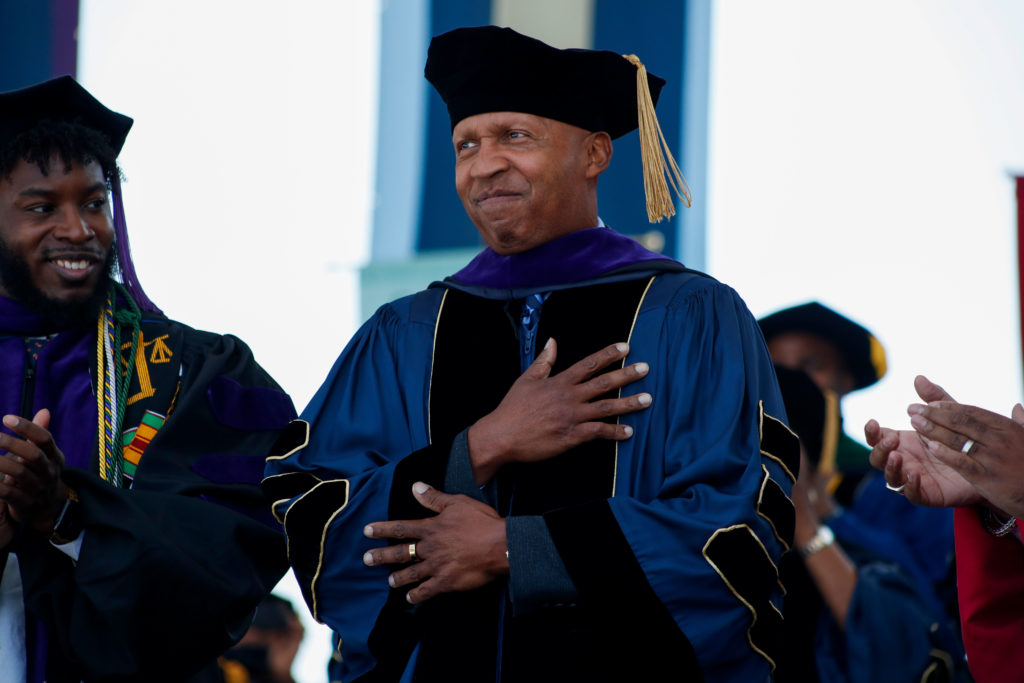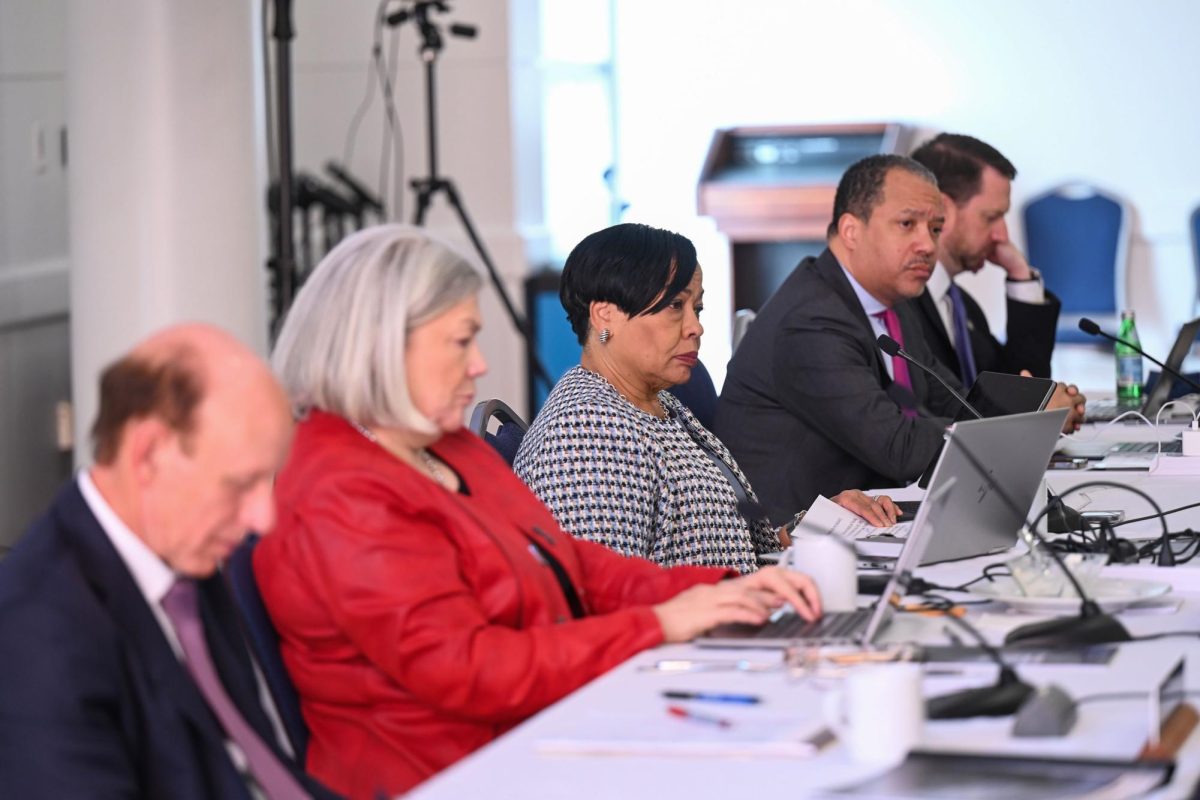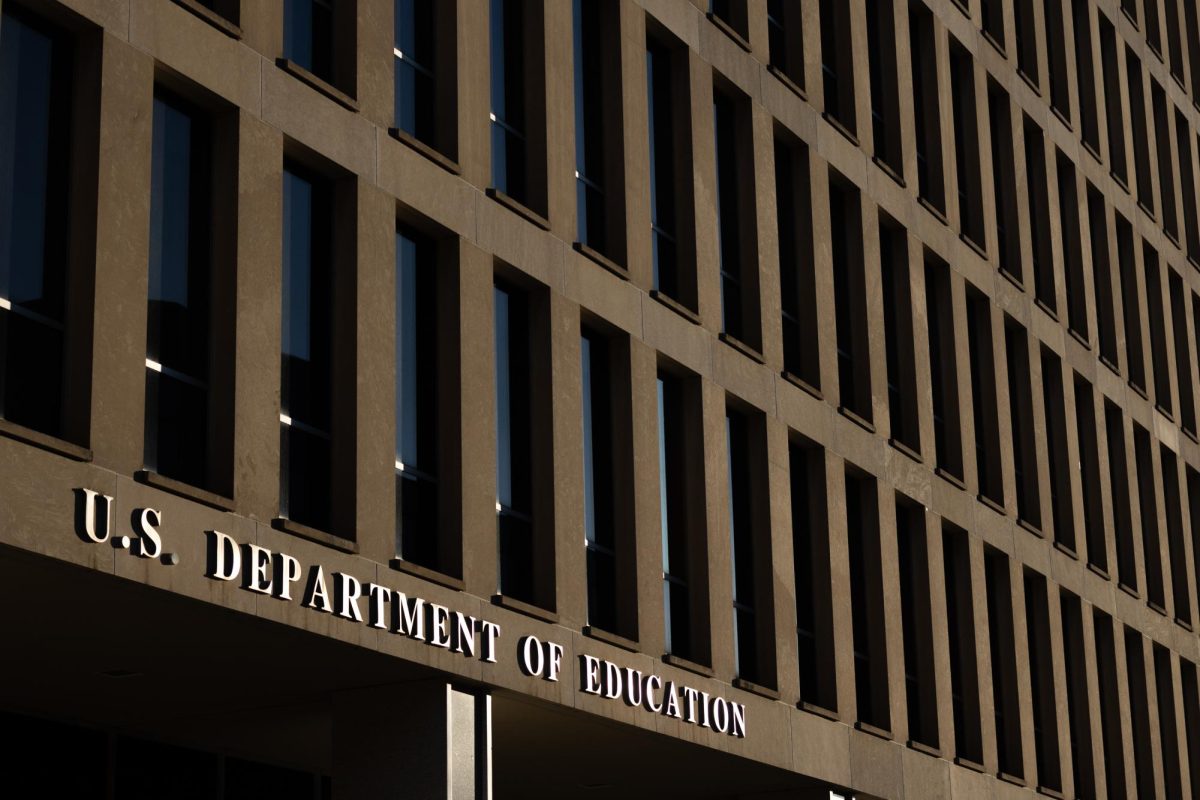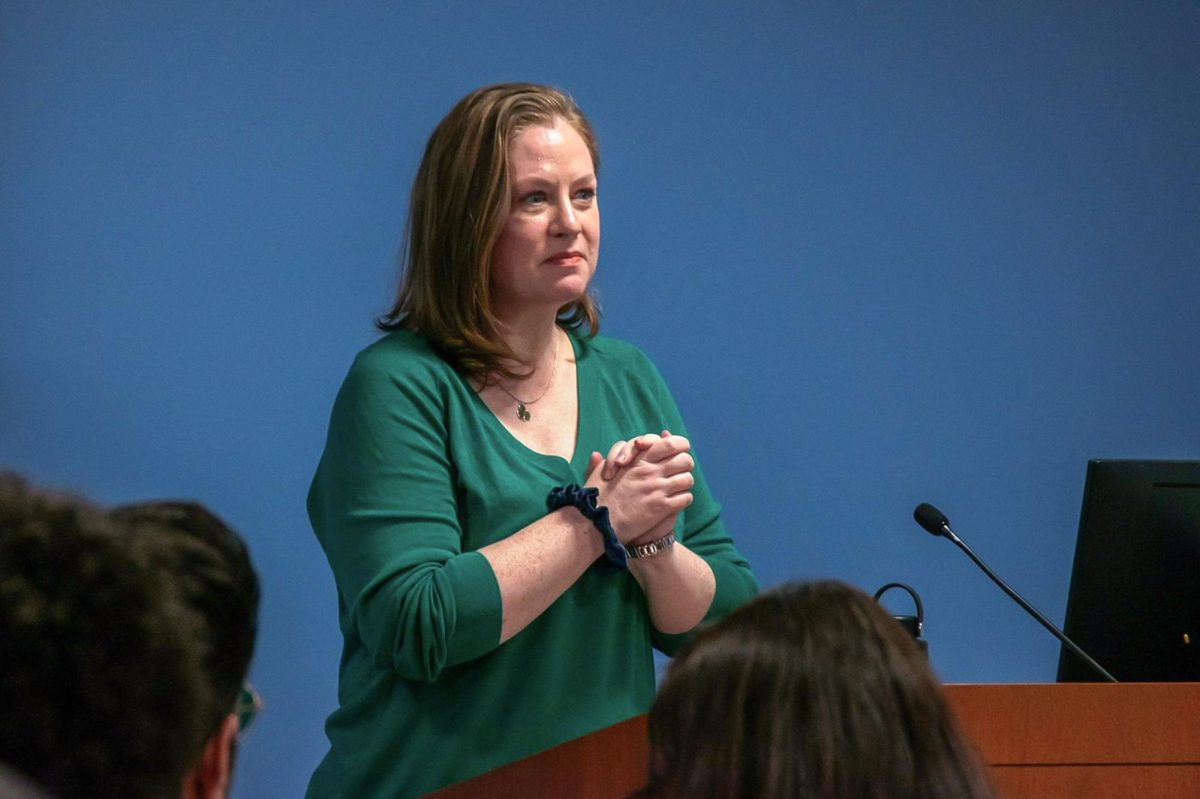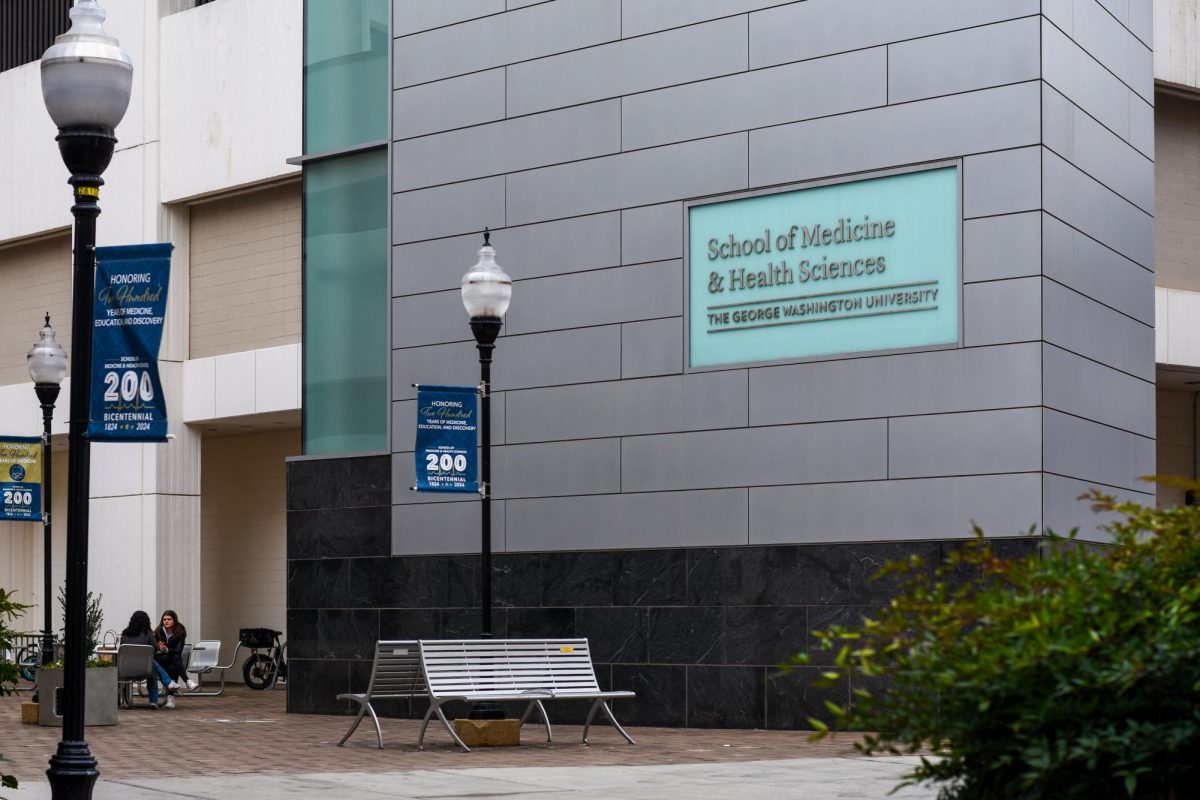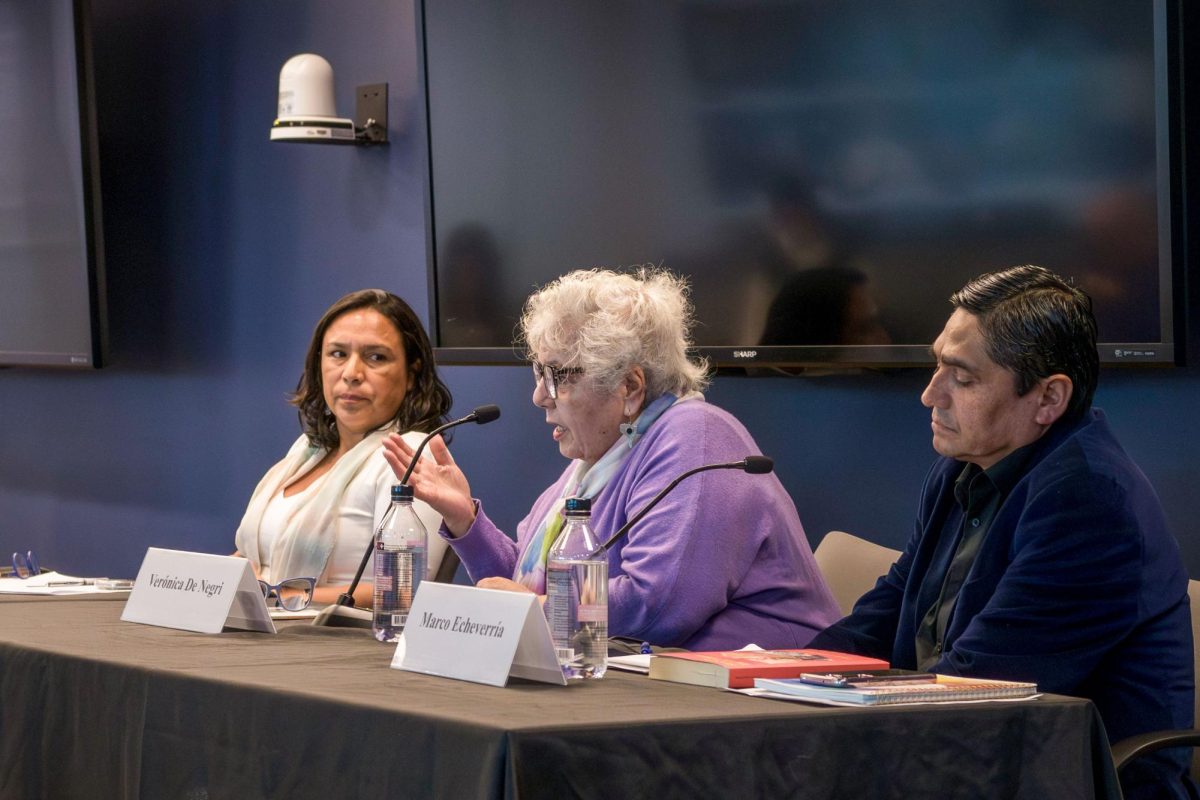For Bryan Stevenson, hope is a superpower.
In his career as a lawyer and the founding director of the Equal Justice Initiative, a nonprofit that has provided legal representation to individuals denied a fair trial or wrongly convicted since 1989, Stevenson said he has encountered and advocated for hundreds of people wrongfully convicted and unjustly sentenced to prison. But while Stevenson said the world can feel “complicated” and “overwhelmed” in his address to a sea of about 6,000 graduates, guests and alumni gathered at the National Mall for Commencement on Sunday, he encouraged graduates to remain optimistic because hope is “key” to one’s capacity to make a difference.
“Hopelessness is the enemy of justice,” Stevenson said in the address. “Injustice prevails where hopelessness persists.”
Alongside mastering studies within their chosen field, Stevenson said he hopes graduates learned something about how to address the “suffering,” inequality and injustice in the world during their time at the University and continue to hone their abilities as “change makers.”
“I believe we have to create a generation of people like you, who are not just engineers, nurses, doctors, lawyers, teachers, business leaders but are people who also are committed to doing things that increase the justice quotient in our world,” Stevenson said.
Stevenson encouraged graduates to be “proximate” to those experiencing injustice and invited them to “get next” to people who are suffering, as proximity to inequality can inspire people to make change. He said many Americans don’t take action to understand patterns of oppression, like how Black people are more likely to go to prison than white people, meaning they have “accepted” injustice.
“I discovered that in too many parts of this country, we have a legal system that treats you better if you’re rich and guilty than if you’re poor and innocent,” Stevenson said.
Stevenson said graduates must work to change narratives rooted in fear and anger, which he said are the “essential ingredients” used to justify injustice, seen in events like the Holocaust and Rwandan genocide. He said American politicians’ narratives of fear and anger portrayed drug addiction as a crime issue when it should have been a health care issue during the War on Drugs in 1970s and 80s.
“We’ve got to commit to an era of truth and justice, truth and reconciliation, truth and restoration, truth and redemption,” Stevenson said.
Stevenson said he once met an older man who had cuts, scars and bruises from being attacked while registering Black people to vote in the South in the 1960s. He said the man called these marks his “medals of honor” and that graduates will earn their own medals of honor if they become familiar with those experiencing injustice, end narratives of fear and anger and stay hopeful.
“I’m going to be there to celebrate your medals of honor each day you gain them, when you stand up for the things that are right and just,” Stevenson said.
GW administrators, faculty, students and alumni made additional addresses to graduates and accepted awards and honorary degrees while sharing lessons from family members and requesting graduates seek out the change they wish to see in the world.
Interim University President Mark Wrighton — who incoming University President Ellen Granberg will replace after he finishes his 18-month presidential term June 30 — asked graduates to use the leadership skills they gained through their education to “empower” their communities and the world.
“Much confidence has been properly placed in you, and we will see a large return on that investment,” Wrighton said.
Student speaker Giselle Garcia, a graduating senior majoring in criminal justice, began her speech with a quote from Puerto Rican musician Bad Bunny about how it is easier to do things with love and passion. She said she urges graduates, who “poured their hearts” into different disciplines, to “rock the boat” and create change.
“I implore you: be intentional, have conviction and take up space,” Garcia said. “You have already accomplished the dream playing out in this very moment but go further.”
Garcia said her grandmother was “daring and fearless” and that her grandmother’s soul speaks through her with love and passion. She said graduates carry the “strength and tenacity” of their ancestors and should help their communities in honor of their ancestors.
“Let’s promise them to catalyze the shift our society so desperately needs, to be moral agents of change in every community to which we will belong,” Garcia said.
Michael Milken, the namesake of the Milken Institute School of Public Health, accepted an honorary Doctor of Science degree and said Martin Luther King Jr. and the lessons from his parents and the “Greatest Generation” fueled his belief that one person can influence society. Former President Donald Trump pardoned Milken in 2020 after he pleaded guilty to committing financial crimes in 1990.
“One person can make and change the world,” Milken said.
Walter Reich, the Yitzhak Rabin Memorial Professor of International Affairs and a recipient of the President’s Medal, said the medal is “especially” meaningful and personal when thinking of GW Class of 1924 alumnus Carl Lutz, a former Swiss diplomat who posthumously received the President’s Medal in 2014 for helping protect 62,000 Jewish Hungarians during the Holocaust.
“I suddenly thought of that hero and GW graduate who accomplished truly great things, whose deeds render this medal so precious,” Reich said.
Mary Ellsberg, the founding director of GW’s Global Women’s Institute and recipient of a President’s Medal, said her father Daniel Ellsberg — who released the Pentagon Papers in 1971, a classified report about U.S. involvement in the Vietnam War — “shaped” her life and work. She said her father taught her the value of information as “the right of all people” and that his work has been a model for her own.
“His example inspired me to consider how I might use the privileges of my background and my education to promote a more just and compassionate world,” Ellsberg said.
Frank Sesno, the director of strategic initiatives of the School of Media and Public Affairs and creator of the sustainability storytelling platform Planet Forward, accepted a President’s Medal and said he dedicates it to the graduates who are the “renewable energy” that “propels” humanity. He said graduates face “daunting” problems but that today’s technology allows them to solve those issues.
“You can write an inspiring story, you can be a central character, you can move the climate forward and that gives all of us hope and motivation,” Sesno said.


